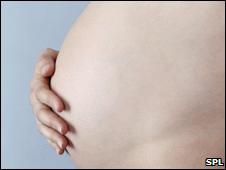Birth impact on learning problems
- Published

Babies born slightly early or two weeks late have a marginally raised risk of learning difficulties - from poor vision to autism, research suggests.
The Glasgow University study of 400,000 schoolchildren found those born between 37 to 39 weeks were 16% more likely to develop problems than those born at 40.
But the overall risk was still relatively low, at 5% of all children.
Elective Caesareans are now commonly carried out at 39 weeks.
Writing in the Public Library of Science Medicine journal, the Scottish-led team suggested their findings should inform the debate on whether and when to undergo a Caesarean.
But the Royal College of Obstetricians and Gynaecologists (RCOG) said very few women opted for a surgical birth without reason, and that to delay the operation could put the health of mother and baby at risk.
Intervening
It has long been established that babies born prematurely - at 24 weeks - are significantly more likely to suffer learning difficulties and disabilities. It has also been recognised that those born a few weeks early may have respiratory difficulties among other immediate problems.
But this is the largest study of its kind to track the impact these slightly early births may have on development later on, analysing data on Special Educational Needs (SEN) - a broad spectrum which can include minor learning delays, dyspraxia and attention deficit disorder.
In total, nearly 5% of the children studied were recorded as having SEN.
The likelihood of their having such a diagnosis decreased the longer their mother's pregnancy had lasted, up until 42 weeks - when it rose sharply.
This means that for every 100 babies born between 37 and 39 weeks, there may be one more diagnosis of SEN than among 40-week contemporaries.
Health reasons may explain why some babies are born spontaneously slightly before term, and this in turn could be behind later development problems. While these early births are not preventable, the research team suggested some elective Caesareans could be reconsidered.
"Early term births - between 37 and 39 weeks gestation - are becoming more common, because more mothers are electing to be delivered early for non-medical reasons - so-called birth scheduling," lead author Jill Pell, an expert in public health and health policy at Glasgow University, wrote.
"These findings have implications for clinical practice in relation to undertake elective delivery and the timing of elective deliveries."
Balancing act
But Professor James Walker, a consultant and spokesperson from the RCOG said very few Caesareans were now carried out before 39 weeks and the vast majority of elective operations were for good medical reasons.
"The findings of this study do seem credible, but the risk they highlight has to be balanced against the risk of waiting for a mother to reach term. If she then goes into labour at night, or ends up having an emergency Caesarean, these present much greater risks.
"But we do all have to be aware of the consequences of medical intervention, as well as the consequences of not intervening, and make decisions accordingly. This study adds to the body of what we know."
Cathy Warwick, general secretary of the Royal College of Midwives, said: "This new research highlights another reason for women and professionals to think carefully about the necessity for each elective caesarean section.
"There is a real need to encourage more normal births and midwives are doing this. Midwives need to have the time to spend with women to discuss all the birth options available to them, and to offer them help and advice. There are many examples of this happening across the country, and I would like to see many more."
Latest figures show a quarter of all births in the UK are carried out by Caesarean. Some 15% of these are emergency operations, and 10% are planned. About 7% of these elective operations are thought to be due to the mother's wish rather than medical grounds.
- Published27 October 2009
- Published2 May 2007
- Published22 September 2006
- Published31 March 2005
- Published15 December 2004